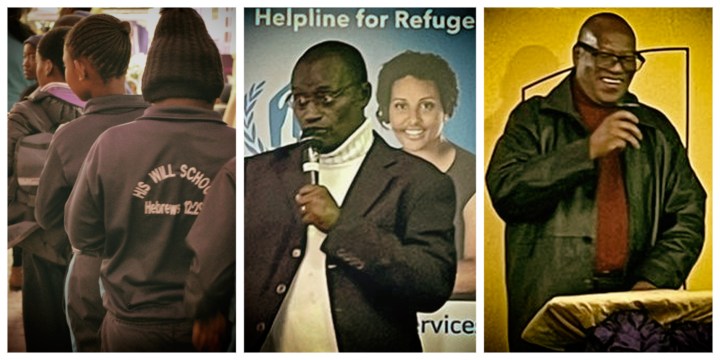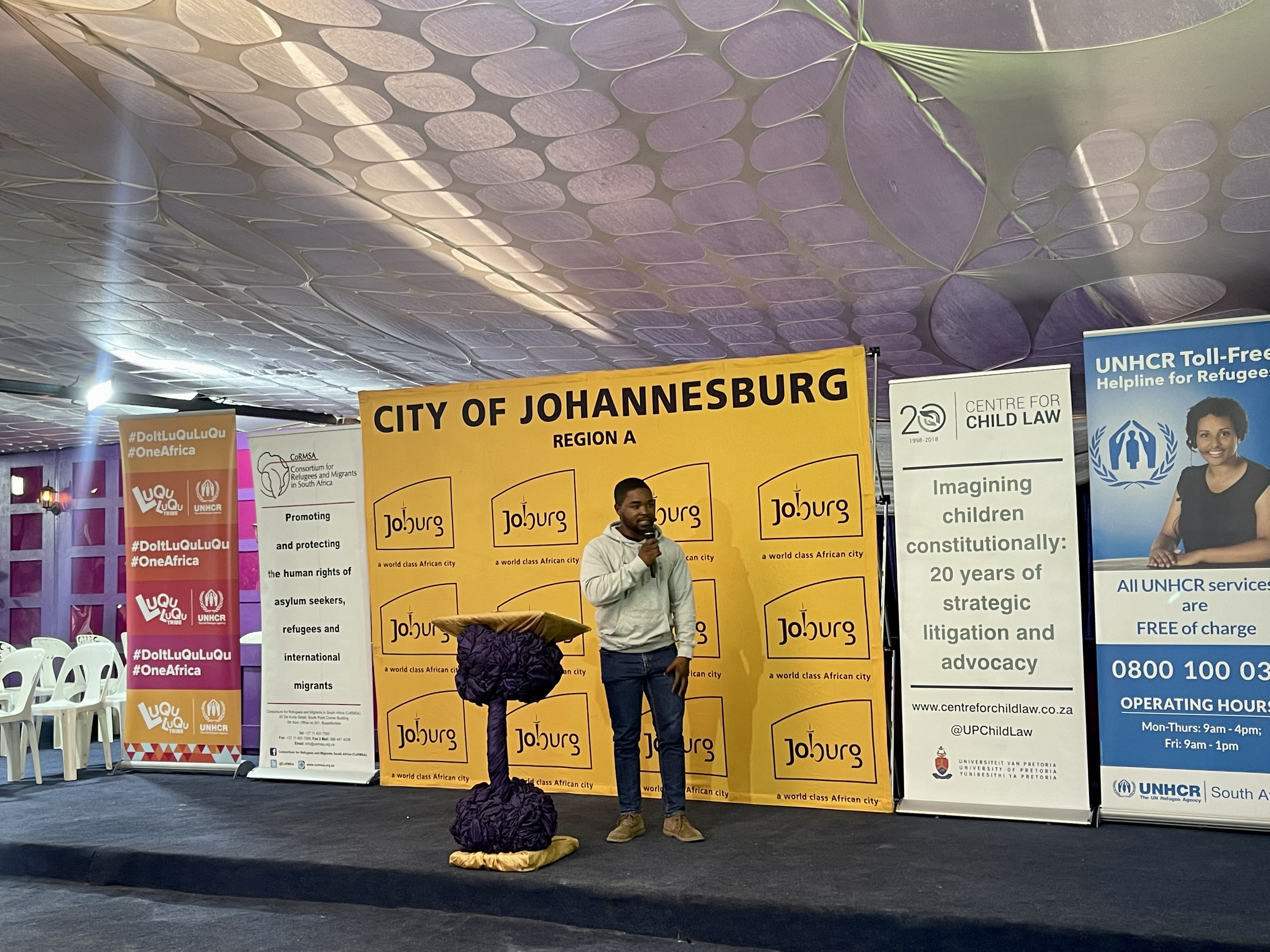WORLD REFUGEE DAY
Help them, don’t hate them – Joburg pupils urged to open their hearts to desperate foreigners

On World Refugee Day on Thursday, several organisations and City of Johannesburg officials gathered at His Will Combined School in Kaalfontein to drive home the message about the rights and legal protections refugees and asylum seekers have in South Africa – and, crucially, the need for South Africans to have compassion for and help new arrivals.
Help them, live with them, embrace them, and share whatever we have.
That was the message delivered to pupils at a Joburg school on World Refugee Day by Robinson Sathekge from the City of Joburg’s migration unit, who reminded them that refugees are often driven out of their home countries by circumstances beyond their control.
The event at the His Will Combined School in Kaalfontein on 22 June was held to raise awareness, promote integration and social cohesion among local communities and non-nationals. The Consortium for Refugees and Migrants in South Africa, Lawyers for Human Rights, the Centre for Child Law, the South Africa Refugee-led Network, the Centre for the Study of Violence and Reconciliation and the United Nations High Commissioner for Refugees were present.
“We know a lot of them did not come here by choice, but because of circumstances within their own countries – be it war, be it political affiliation, sexual affiliation like we have seen with the new laws passed in Uganda,” Sathekge said.
Read more in Daily Maverick: Uganda approves one of the world’s harshest anti-LGBTQ laws
“It is upon us to welcome them, to make them feel at home, to appreciate their resilience, and to assist them to have a better life,” Sathekge said.
A team effort necessary to support refugees
Supporting refugees cannot be done by one singular organisation and requires a team effort. “We call upon all the role players, especially the government, especially departments like Home Affairs, Employment and Labour, to also play their part,” he said.
Locals also had a role to play in helping refugees. “We need to assist refugees to integrate into local communities. We know there are challenges, we know there are limited resources, and we know the challenges around unemployment, but at the end of the day we need peace. We need to live side by side, embracing one another, and this is our focus,” he said.
Xenophobia and violence against refugees necessitated a discussion to find a common solution. “The challenges… are not insurmountable, they… can be addressed if we all come together and talk.”
“Let’s celebrate World Refugee Day knowing that all these people have taken risks to come to a foreign country, hoping that they’ll get a better life than where they were. So, let us assist them, let us live with them, let us embrace them, let us share whatever we have.”
Human rights status
Nyeleti Baloyi, from the Consortium for Refugees and Migrants in South Africa, said that, among other rights, asylum seekers and refugees have “the right to formal written recognition of refugee status. It allows them to live in South Africa and participate in education and work.”
Refugees also had the right to full legal representation or protection, the same basic health services and basic primary education that South Africans get. “Refugees are human so they are also entitled to human rights, and the rights set out in the Bill of Rights.”
In addition, “we can promote refugee rights by respecting everyone; let us accept everyone, have empathy and try to see things from their perspective”.
Challenges facing refugees
Carol Lemekwana from Lawyers for Human Rights said the challenges faced by refugees included access to healthcare, unlawful arrest, family separation and language barriers.
“The Constitution says that everyone has the right to access healthcare, so no person should be denied access to healthcare because they are not from South Africa or do not have documents,” she said.
Read more in Daily Maverick: Mothers and babies pay heavy price for xenophobia in healthcare services
Despite the legal protections afforded to asylum seekers, refugees and other migrants in South Africa, the detention and deportation of foreigners were often carried out unlawfully. “Sometimes it is because they speak a different language, don’t have documents or they are just being discriminated against.”
When you are deprived of the right to basic education, you end up doing things that are in most cases outside of the bounds of the law.
It was not uncommon for families to be separated during the process of travelling to a country as a refugee, which could cause a breakdown in family structure. “When you are not able to arrive as a family, that destroys the family orientation.
“Sometimes, because you speak a different language that South Africans do not speak, you will be discriminated against and you find yourself very confused.”
Lemekwana encouraged the pupils to accommodate people who speak different languages and help them to learn South African languages.
Gateway right
Stanley Malematja, an attorney from the Centre for Child Law, stressed that the right to basic education “is a gateway right that allows people to have access to other fundamental human rights”.
This right allowed an individual to play a meaningful role in society. “When you are deprived of the right to basic education, you end up doing things that are in most cases outside of the bounds of the law.”
It does not matter whether you are documented, or undocumented, whether you are coming from Zimbabwe or coming from Afghanistan… you have the right to access basic education.
Explaining that refugees “leave basically everything behind, their identity, their identifying documents”, he said South Africans must appreciate that the Constitution says everyone has the right to access basic education. “It does not matter whether you are documented, or undocumented, whether you are coming from Zimbabwe or coming from Afghanistan. For the mere fact that you are within the borders of this country, then it means you have the right to access basic education.”
Harmful narratives and psychosocial support
Claude Marie Bernard Kayitare, a refugee from Rwanda who is part of the South African Refugee-Led Network, said “there is this narrative in our streets that refugees come to take jobs and wives. I have my own wife who I am with and four kids.”
“We are not here to take anyone’s jobs or anyone’s wife, we are here to contribute to the country that accommodated us.”
Kayitare urged the pupils not to use the derogatory term makwerekwere when talking about refugees, but refer to them as brothers and sisters.
Alarming figures
“Today, we have about 108 million displaced people. You go across the world, you have refugees, asylum seekers, people who are not documented or recognised in any country as nationals,” said Dr Matlotleng Matlou from the United Nations High Commissioner for Refugees.

Stanley Malematja, an attorney from the Centre for Child Law, spoke about children’s rights and protection in South Africa as they relate to access to education, describing it as a gateway right that allows people to have access to other fundamental human rights. (Photo: Takudzwa Pongweni)
Most of them – almost 63 million – had been internally displaced owing to conflict and other human rights abuses. The only difference between them and refugees “is that they have not crossed borders”.
The situation in Africa
Africa has the highest number of forcibly displaced people in the world, Matlou said. According to the UN refugee agency’s 2023 figures, 44 million people in sub-Saharan Africa had been displaced.
Climate change was another form of displacement. As of November 2022, drought had displaced 1.8 million people, and more than nine million livestock had died in Ethiopia, Kenya and Somalia after four failed rainy seasons and record-low crop yields. Many people suffering food insecurity sought refuge in other drought-affected regions.
South Sudan had been hit by heavy flooding for a fourth consecutive year, as well as conflict, resulting in more than two million people displaced.
‘Nothing glorious about being a refugee’
Matlou explained that South Africans too were refugees in the 1950s. “We had to learn the languages in those countries, we had to locally integrate, and there were names we were also called.”
Crucially, countries such as Tanzania and Zambia which had South African refugees, had allowed the fight for liberation to continue. The most important thing they had appreciated was that there was a place to lay their heads at night if the international community was helping them, and that they “had some form of sustenance”.
Despite this, Matlou stressed that there was nothing glorious about being a refugee. “We never forgot home, and as a refugee you have your feet in two places. You are in the country where you are staying, you are not fully of that country and you are sometimes reminded of that. You are from your country, but you don’t know your country because you left when you were young or you might not know the language.”
It was important to understand that countries, families, societies, communities, institutions and governments relied on people. If people were traumatised or in a situation where their lives were in danger and they constantly had to run, this hindered their ability to get an education, among other things, and led to wasted human potential.
The refugee agency wanted “durable solutions in which people can be locally integrated, and where they cannot be integrated, they should be able to go back home in safety and dignity”, or go to other countries.
Help available
Mpfareleni Mabidi, from the Centre for the Study of Violence and Reconciliation, explained that they do research on violence and conflict, advocate for the rights of migrants, asylum seekers and refugees, and offer mental health and psychosocial support services.
Individual and family counselling – so they “can be reintegrated back into communities, back to their families” – was free. DM


















 Become an Insider
Become an Insider
Comments - Please login in order to comment.